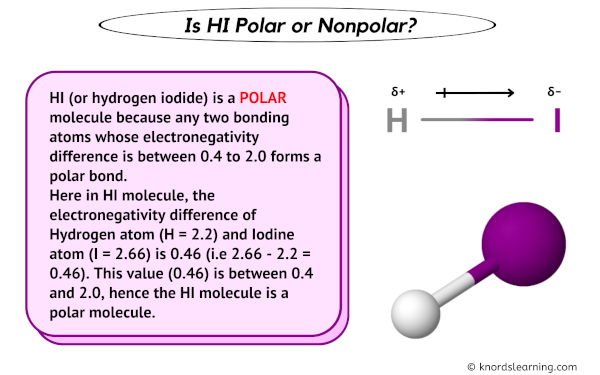
HI (or hydrogen iodide) is a POLAR molecule.
But why?
And how can you say that HI is a polar molecule?
Want to know the reason?
Let’s dive into it!
HI (or hydrogen iodide) is a POLAR molecule because any two bonding atoms whose electronegativity difference is between 0.4 to 2.0 forms a polar bond.
Here in HI molecule, the electronegativity difference of Hydrogen atom (H = 2.2) and Iodine atom (I = 2.66) is 0.46 (i.e 2.66 – 2.2 = 0.46). This value (0.46) is between 0.4 and 2.0, hence the HI molecule is a polar molecule.
Didn’t understand what is written above?
Let me explain this in a short and simple way (with 3D images).
Why is HI a Polar molecule? (Explained!)
HI is a polar molecule because it has a partial positive charge (ẟ+) on the Hydrogen atom and partial negative charge (ẟ-) on the Iodine atom.
In short, the HI molecule forms a pole of positive charge and negative charge on it. Hence HI is a polar molecule.

But wait, let me give you some detailed information about the polarity of HI molecule.
The chemical bonds can be either nonpolar, polar or ionic depending on the difference of the electronegativity values (ΔEN) between the two atoms.

Have a look at the above image.
- If the electronegativity difference (ΔEN) is less than 0.4, then the bond is nonpolar covalent bond.
- If the electronegativity difference (ΔEN) is between 0.4 to 1.7, then the bond is polar covalent bond.
- If the electronegativity difference (ΔEN) is greater than 1.7, then the bond is an ionic bond. [1] [2] [3] [4]
Now let’s come to the example of HI molecule.
You can see the electronegativity values of Hydrogen (H) and Iodine (I) atoms from the periodic table given below.

From the above image;
So for HI, the electronegativity difference (ΔEN) = 2.66 – 2.2 = 0.46
This value lies between 0.4 to 1.7, which indicates that the bond between Hydrogen (H) and Iodine (I) is polar covalent bond.
Hence, the Hydrogen iodide (or HI) is a polar molecule.
How HI becomes a Polar molecule?
In a HI molecule, there is one hydrogen atom (H) and one iodine atom (I). Both these atoms are covalently bonded with each other by sharing one electron pair between them.

If we compare the electronegativity of hydrogen and iodine , then the iodine is more electronegative than hydrogen.
This means that the iodine atom has more tendency to attract the shared electron pair towards itself.

As the electron pair remains attracted towards the iodine atom, the partial negative charge (ẟ-) appears on the Iodine atom (I) and partial positive charge (ẟ+) appears on the Hydrogen atom (H).

In this way the partial positive and partial negative charges are generated on the HI molecule and hence HI becomes a polar molecule.
I hope you have understood the reason behind the polarity of Hydrogen iodide (i.e HI) molecule.
See the polarity of other molecules to make your concepts clear:
Is SeO2 Polar or Nonpolar?
Is OH- Polar or Nonpolar?
Is SeF6 Polar or Nonpolar?
Is ICl3 Polar or Nonpolar?
Is XeO3 Polar or Nonpolar?
Jay is an educator and has helped more than 100,000 students in their studies by providing simple and easy explanations on different science-related topics. With a desire to make learning accessible for everyone, he founded Knords Learning, an online learning platform that provides students with easily understandable explanations.
Read more about our Editorial process.
